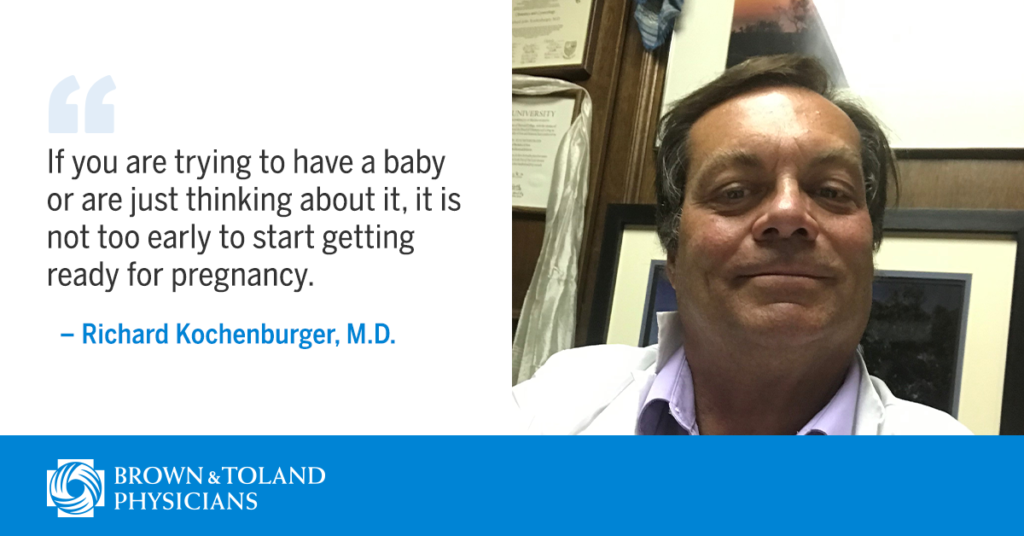Getting Ready for Pregnancy

By Richard Kochenburger, MD, MPH, FACOG
Becoming pregnant and giving birth, followed by nurturing and raising a child, can be one of the most joyful, fulfilling and important undertakings in a woman’s life. Unfortunately, birth defects do occur in approximately 2- to 3-percent of all pregnancies with varying degrees of severity.

If you are trying to have a baby or are just thinking about it, it is not too early to start getting ready for pregnancy. During this National Birth Defects Prevention Month, I’d like to share some of the most important things you can do before and between pregnancies to increase the chances of having a healthy baby:
Get 800 µg of folic acid each day.
Folic acid, a B vitamin, can help prevent birth defects of the developing brain and spine. Women can get folic acid through a diet rich in folate, through standard prenatal vitamins and multivitamins, or a combination of the two.
Eat a diet rich in omega-3 fatty acids.
Besides having cardiovascular benefits, omega-3 fatty acids can also optimize fetal health and brain development. Many prenatal vitamins are now enriched with omega-3 fatty acids and they can also be obtained through numerous supplements.
Avoid harmful substances.
Avoiding smoking and cigarette smoke and minimizing alcohol and caffeine intake is crucial. During pregnancy, women should also eliminate or minimize possible exposure to hazardous chemicals and substances in the environment from both household and industrial products.
Plan ahead.
When thinking about becoming pregnant, women should consider assessments for possible medical conditions such as diabetes as well as thyroid and collagen vascular diseases. Blood tests to screen for these illnesses are readily available, and can include a hemoglobin A1c test for prediabetes and diabetes, as well as a TSH test for thyroid function and an ANA test to screen for possible autoimmune diseases.
Choose a healthy lifestyle.
A woman who is obese (a body mass index [BMI] of 30 or higher) before pregnancy is at a higher risk for complications during pregnancy. Getting to a healthy weight and BMI through diet and exercise is always a good idea for preventing birth defects, as well as for boosting overall health in general.
Check your medications.
Many women need to take medicine to stay healthy during pregnancy. Some medicines can be harmful when taken during pregnancy, but others are unlikely to cause harm. If you are planning to become pregnant, you should go over all prescriptions, over-the-counter medicines, herbal and dietary supplements, and vitamins with your health care provider. The CDC’s Treating for Two program offers some useful information on this topic.
Information regarding minimizing birth defects can readily be found on websites from such organizations as the March of Dimes, American College of Obstetricians and Gynecologists and various public health agencies such as the Centers for Disease Control and Prevention (CDC).
Best wishes for future healthy pregnancies and optimal health!
Dr. Richard Kochenburger has maintained a highly personalized, solo general obstetrics and gynecology practice in the same office in Alameda since 1993. Besides attending the majority of his patients’ deliveries, Dr. Kochenburger also specializes in complex benign gynecological issues, including minimally invasive gynecologic surgery. Dr. Kochenburger loves the outdoors, is an avid equestrian, is active in his church, and loves spending time with his daughter, son-in-law and two young grandchildren.
